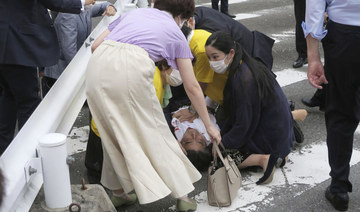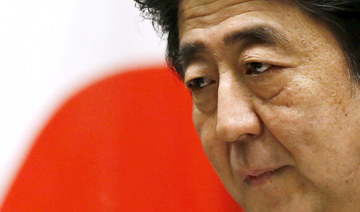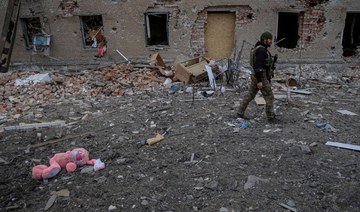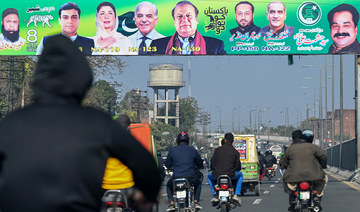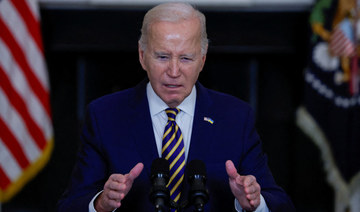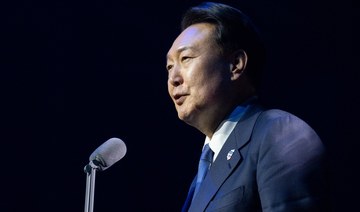TOKYO: Japanese went to the polls Sunday in the shadow of the assassination of former Prime Minister Shinzo Abe, gunned down while making a campaign speech for the governing party that cruises to a likely major victory.
Amid voting Sunday, police in western Japan sent the alleged assassin to a local prosecutors’ office for further investigation toward pressing murder charges, the day after a top regional police official acknowledged possible security lapses that allowed the attacker to get so close and fire a bullet into the still-influential former Japanese leader.
In a country still recovering from the shock, sadness and fear of Abe’s shooting — the first of a former or serving leader to be assassinated in postwar Japan — polling started for half of the upper house, the less powerful of Japan’s two-chamber parliament.
Abe was shot in Nara on Friday and airlifted to a hospital but died of blood loss. Police arrested a former member of Japan’s navy at the scene. Police confiscated his homemade gun and several others were later found at his apartment.
The alleged attacker, Tetsuya Yamagami, told investigators he acted because of Abe’s rumored connection to an organization that he resented, police said, but had no problem with the former leader’s political view. The man had developed hatred toward a religious group that his mother was obsessed about and that bankrupted a family business, according to media reports, including some that identified the group as the Unification Church.
Abe’s body, in a black hearse accompanied by his wife, Akie, returned to his home in Tokyo’s upscale residential area of Shibuya, where many mourners, including Prime Minister Fumio Kishida, their predecessors and top party officials, paid tribute. His wake and funeral are expected in coming days.
Nara prefectural police chief Tomoaki Onizuka on Saturday said that Abe’s assassination was his “greatest regret” in his 27-year career. He said problems with security were undeniable, that he took the shooting seriously and will review the guarding procedures.
Abe’s assassination ahead of Sunday’s parliamentary election shocked the nation and raised questions over whether adequate security was provided for the former prime minister.
Some observers who watched videos of the attack noted a lack of attention in the open space behind Abe as he spoke.
Experts also said Abe was more vulnerable standing on the ground level instead of atop a campaign vehicle, a standard for premier-class politicians, but that option was reportedly unavailable due to his hastily arranged visit to Nara.
Mitsuru Fukuda, a crisis management professor at Nihon University, said police were seen focusing frontward and paying little attention to what was behind Abe, noting that the suspect was approaching the former leader unnoticed until he fired the first shot.
“Clearly there were problems,” Fukuda said.
The first shot narrowly missed Abe and hit an election vehicle. The second entered from his upper left arm damaged his neck artery, causing massive bleeding and death.
Fukuda said that election campaigns provide a chance for voters and politicians to interact because “political terrorism” was extremely rare in postwar Japan. It’s a key democratic process, but Abe’s assassination could prompt stricter security at crowded events like campaigns, sports games and others.
On Saturday, when party leaders went out for their final appeals under heightened security, there were no more fist-touches — a COVID-19 era alternative to handshakes — or other close-proximity friendly gestures they used to enjoy.
After Abe’s assassination, Sunday’s election had a new meaning, with all political leaders emphasizing the importance of free speech and their pledge not to back down to violence against democracy.
“We absolutely refuse to let violence shut out free speech,” Kishida said in his final rally in northern city of Niigata on Saturday amid tightened security. “We must demonstrate that our democracy and election will not back down to violence.”
According to the Asahi newspaper, Yamagami was a contract worker at a warehouse in Kyoto, operating a forklift. He was described as a quiet person in the beginning but started ignoring rules that led to quarrels with his colleagues, then he started missing work and quit in April citing health problems. A next-door neighbor at his apartment told Asahi he never met Yamagami, though he recalled hearing noises like a saw being used several times late at night over the past month.
Japan is known for its strict gun laws. With a population of 125 million, it had only 21 gun-related criminal cases in 2020, 12 of them gang-related, according to the latest government crime paper. Experts say, however, some recent attacks involved use of consumer items such as gasoline, suggesting increased risks for ordinary people to be embroiled in mass attacks.
While media surveys have predicted a major victory for the governing Liberal Democratic Party amid fractured and weak opposition, a wave of sympathy votes from Abe’s assassination could bring a bigger victory than Kishida’s modest goal of winning the house majority.
Even after stepping down as prime minister in 2020, Abe was highly influential in the LDP and headed its largest faction. His absence could change power balance in the governing party that almost uninterruptedly ruled postwar Japan since its 1955 foundation, experts say.
“This could be a turning point” for the LDP over its divisive policies on gender equality, same-sex marriages and other issues that Abe-backed ultra-conservatives with paternalistic family values had resisted, said Fukuda.
Japan’s current diplomatic and security stance is unlikely to change because fundamental changes had been already been made by Abe. His ultra-nationalist views and realistic policy measures made him a divisive figure to many, including in the Koreas and China.
Abe stepped down two years ago blaming a recurrence of the ulcerative colitis he’d had since he was a teenager. He said he regretted leave many of his goals unfinished, including the issue of Japanese abducted years ago by North Korea, a territorial dispute with Russia, and a revision to Japan’s war-renouncing constitution that many conservatives consider a humiliation because of poor public support.
Abe was groomed to follow in the footsteps of his grandfather, former Prime Minister Nobusuke Kishi. His political rhetoric often focused on making Japan a “normal” and “beautiful” nation with a stronger military through security alliance with the United States and bigger role in international affairs.
He became Japan’s youngest prime minister in 2006, at age 52. But his overly nationalistic first stint abruptly ended a year later, also because of his health, prompting six years of annual leadership change.
He returned to office in 2012, vowing to revitalize the nation and get its economy out of its deflationary doldrums with his “Abenomics” formula, which combines fiscal stimulus, monetary easing and structural reforms. He won six national elections and built a rock-solid grip on power.
Japan votes for key election in shadow of Abe assassination
https://arab.news/2dbwd
Japan votes for key election in shadow of Abe assassination
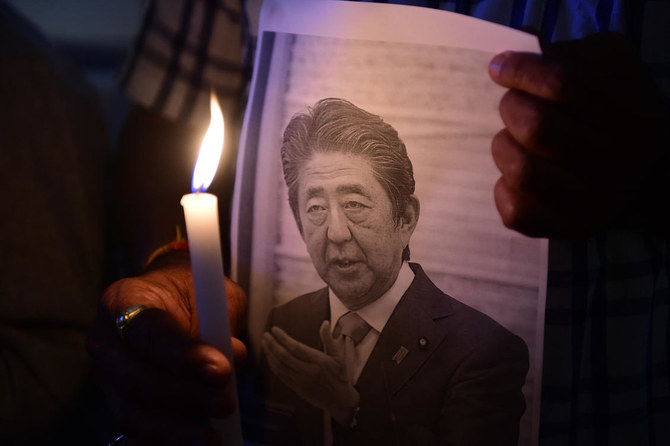
- Police arrested a former member of Japan’s navy at the scene
- Abe’s assassination ahead of Sunday’s parliamentary election shocked the nation and raised questions over whether adequate security was provided for the former prime minister.
What is at stake in UK local voting ahead of a looming general election

LONDON: Millions of voters in England and Wales will cast their ballots on Thursday in an array of local elections that will be the last big test before a U.K. general election that all indicators show will see the Conservative Party ousted from power after 14 years.
Prime Minister Rishi Sunak will hope he can point to successes, notably in a couple of key mayoral races, to douse talk that the Conservative Party will change leader again before the United Kingdom's main election, which could take place as soon as next month.
On the other hand, Labour Party leader Keir Starmer will hope Thursday's local elections confirm what opinion polls have shown for two years — that Labour is on course for power for the first time since 2010.
“The national context going into these local elections is very good for Labour and very bad for the Conservatives,” said Rob Ford, professor of politics at the University of Manchester.
As is often the case in British local elections, the run-up is about expectation management, so any outperformance can be painted as a success.
That's certainly the case with the Conservatives, who are widely predicted to lose around half of the 1,000 seats they are contesting. They have pointed out, for example, that the equivalent elections were held in 2021 when the government of then Prime Minister Boris Johnson was riding high following the rollout of the coronavirus vaccines.
Thursday's elections are important in themselves — voters decide who will run many aspects of their daily lives, such as bin collections, the state of the roads and local crime prevention measures, for the coming years.
But with a general election looming, they will be viewed through a national prism.
Here are five things to know:
What's happening?
Voters in England and Wales will go to the polls for local, mayoral, and police and crime commissioner elections.
The voting is the final test of public opinion before the general election, which has to take place by January 2025 but which Sunak, who has the power to decide on the date, has indicated will be in the second half of 2024.
As well as a number of mayoral votes, including in London where Sadiq Khan is expected to win a third term, there are more than 100 elections to local councils and nearly 40 for local police and crime commissioners.
There's also a special parliamentary election in Blackpool South, a long-time Labour seat that went Conservative in the last election in 2019, when Johnson won a big victory. The results will be announced in coming days. London's mayoral result isn't due until Saturday.
No elections are taking place in Scotland or Northern Ireland, the other constituent nations of the U.K.
What's at stake for Sunak?
Potentially his job. Sunak replaced Liz Truss, who quit after 45 days following a budget of unfunded tax cuts that roiled financial markets and sent borrowing costs for homeowners surging.
Sunak, who warned about the economic implications of Truss' plan, was supposed to be a steady hand after taking the top job in October 2022. If opinion polls are right, he's not improved the Conservatives' ratings, which had even prior to Truss, been battered by the circus surrounding Johnson, who was ousted over a series of ethics scandals.
With the Conservatives seemingly headed for one of their biggest-ever electoral defeats, there's mounting speculation Sunak may face a leadership battle if Thursday's elections are really bad.
Key to his survival could be the mayoral elections in the West Midlands and Tees Valley in the northeast of England. Should Conservative mayors Andy Street and Ben Houchen hold on, he may win some respite from restive lawmakers in his party. Should both lose, he may face trouble.
Is Labour headed for power?
In historical terms, Labour has a mountain to climb if it's going to form the next government.
It's performance in 2019 was its worst since 1935. Starmer has tried to bring the party back to the center of British politics after the five-year leadership of veteran left-winger Jeremy Corbyn.
Starmer's cautious approach has clearly worked if opinion polls are anything to go by. But it's fair to say that enthusiasm levels are far lower than those that heralded the arrival of Tony Blair ahead of the 1997 general election.
That may be partly due to the more challenging economic backdrop, but Starmer, formerly a human rights lawyer, lacks the razzmatazz of his predecessor. Even so, Starmer will hope Labour notches up big wins in areas it lost under Corbyn, in the north of England and in the Midlands.
One point of concern is how many traditionally Labour supporters in Muslim communities fail to vote in protest at the party's stance over the conflict in Gaza.
Are voters being tactical?
One of the contributing factors to Blair's landslide victory in 1997 came from so-called tactical voting, whereby some voters put aside their preferred political party and back whoever they think is most likely to defeat the Conservative candidate.
Tactical voting has reemerged in recent years and could become key in the general election. It usually involves voters sympathetic to Labour in parts of the country, such as southwest England, backing the much-smaller Liberal Democrats and Liberal Democrat supporters loaning votes to Labour in the Midlands and the north of England.
Conservative lawmakers across the U.K., even in supposedly safe seats, will be hugely concerned if voters think more tactically.
Pincer from the right?
The Conservatives don't just face a challenge from the left. Reform UK is trying to outflank it from the right.
Though it is standing in a few seats, Conservatives will worry that support for the party will see Labour and others come through the middle.
Reform UK, which claims to be tougher on issues such as immigration and on Brexit, has said it won't stand aside to give incumbent Conservative lawmakers an easier chance at the general election, as its former incarnation, The Brexit Party, did in 2019. The Blackpool South special election will be particularly interesting on that front.
As India votes, misinformation surges on social media: ‘The whole country is paying the price’

- Tech companies like Google and Meta say they are working to combat deceptive or hateful content while helping voters find reliable sources
- Researchers say their promises ring hollow after years of failed enforcement, “cookie-cutter” approaches that fail to account for India’s diversity
NEW DELHI: Bollywood stars seldom weigh in on politics, so videos showing two celebrities criticizing Indian Prime Minister Narendra Modi — and endorsing his main opposition, the Congress party — were bound to go viral.
But the clips of A-list actors Aamir Khan and Ranveer Singh were fake, AI-generated videos that were yet another example of the false or misleading claims swirling online with the goal of influencing India’s election. Both actors filed complaints with police but such actions do little to stanch the flow of such misinformation.
Claims circulating online in India recently have misstated details about casting a ballot, claimed without evidence that the election will be rigged, and called for violence against India’s Muslims.
Researchers who track misinformation and hate speech in India say tech companies’ poor enforcement of their own policies has created perfect conditions for harmful content that could distort public opinion, spur violence and leave millions of voters wondering what to believe.
“A non-discerning user or regular user has no idea whether it’s someone, an individual sharing his or her thoughts on the other end, or is it a bot?” Rekha Singh, a 49-year-old voter, told The Associated Press. Singh said she worries that social media algorithms distort voters’ view of reality. “So you are biased without even realizing it,” she said.
In a year crowded with big elections, the sprawling vote in India stands out. The world’s most populous country boasts dozens of languages, the greatest number of WhatsApp users as well as the largest number of YouTube subscribers. Nearly 1 billion voters are eligible to cast a ballot in the election, which runs into June.
Tech companies like Google and Meta, the owner of Facebook, WhatsApp and Instagram, say they are working to combat deceptive or hateful content while helping voters find reliable sources. But researchers who have long tracked disinformation in India say their promises ring hollow after years of failed enforcement and “cookie-cutter” approaches that fail to account for India’s linguistic, religious, geographic and cultural diversity.
Given India’s size and its importance for social media companies, you might expect more of a focus, say disinformation researchers who focus on India.
“The platforms are earning money off of this. They are benefiting from it, and the whole country is paying the price,” said Ritumbra Manuvie a law professor at the University of Groningen in the Netherlands. Manuvie is a leader of The London Story, an Indian diaspora group which last month organized a protest outside Meta’s London offices.
Research by the group and another organization, India Civil Watch International, found that Meta allowed political advertisements and posts that contained anti-Muslim hate speech, Hindu nationalist narratives, misogynistic posts about female candidates as well as ads encouraging violence against political opponents.
The ads were seen more than 65 million times over 90 days earlier this year. Together they cost more than $1 million.
Meta defends its work on global elections and disputed the findings of the research on India, noting that it has expanded its work with independent fact-checking organizations ahead of the election, and has employees around the world ready to act in case its platforms are misused to spread misinformation. Nick Clegg, Meta’s president of global affairs, said of India’s election: “It’s a huge, huge test for us.”
“We have months and months and months of preparation in India,” he told The Associated Press during a recent interview. “We have teams working around the clock. We have fact checkers in multiple languages operating in India. We have a 24-hour escalation system.”
YouTube is another problematic site for disinformation in India, experts say. To test how well that video-sharing platform was doing in enforcing its own rules, researchers at the nonprofits Global Witness and Access Now created 48 fake ads in English, Hindi and Telugu with false voting information or calls for violence. One claimed India raised its voting age to 21, though it remains 18, while another said women could vote by text message, though they cannot. A third called for the use of force at polling places.
When Global Witness submitted the ads to YouTube for approval, the response was disappointing, said Henry Peck, an investigator at Global Witness.
“YouTube didn’t act on any of them,” Peck said, and instead approved the ads for publication.
Google, YouTube’s owner, criticized the research and noted that it has multiple procedures in place to catch ads that violate its rules. Global Witness removed the ads before they could be spotted and blocked, the company said.
“Our policies explicitly prohibit ads making demonstrably false claims that could undermine participation or trust in an election, which we enforce in several Indian languages,” Google said in a statement. The company also noted its partnerships with fact-checking groups.
AI is this year’s newest threat, as advances in programs make it easier than ever to create lifelike images, video or audio. AI deepfakes are popping up in elections across the world, from Moldova to Bangladesh.
Senthil Nayagam, founder of an AI startup called Muonium AI, believes there is growing demand for deepfakes, especially of politicians. In the run up to the election, he had several inquiries on making political videos using AI. “There’s a market for this, no doubt,” he said.
Some of the fakes Nayagam produces feature dead politicians and are not meant to be taken seriously, but other deepfakes circulating online could potentially fool voters. It’s a danger Modi himself has highlighted.
“We need to educate people about artificial intelligence and deepfakes, how it works, what it can do,” Modi said.
India’s Information and Technology Ministry has directed social media companies to remove disinformation, especially deepfakes. But experts say a lack of clear regulation or law focused on AI and deepfakes makes it harder to squash, leaving it to voters to determine what is true and what is fiction.
For first-time voter Ankita Jasra, 18, these uncertainties can make it hard to know what to believe.
“If I don’t know what is being said is true, I don’t think I can trust in the people that are governing my country,” she said.
New film captures Afghan women’s courage in failed peace talks with Taliban
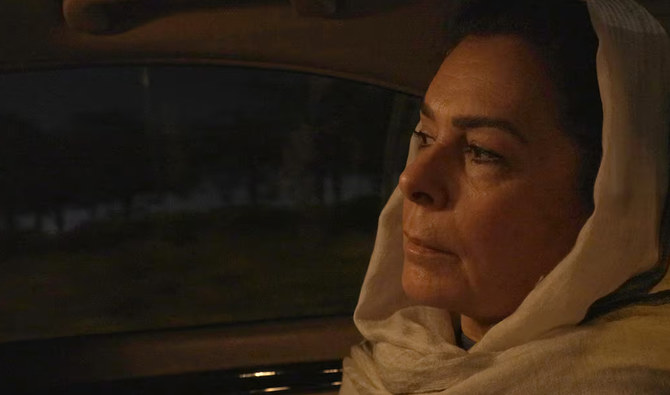
- Directed by Roya Sadat, the 95-minute “The Sharp Edge of Peace” is a testament to the courage of Afghan women leaders
- Fawzia Koofi and other leaders continue advocating for change since Taliban seized power in 2021 and curtailed women’s rights
TORONTO: The new documentary “The Sharp Edge of Peace” begins with a harrowing scene: Fawzia Koofi, a former member of Afghanistan’s parliament and a women’s rights activist, recovering in a hospital bed after surviving an assassination attempt in August 2020.
While traveling to Kabul with her daughter, Koofi was ambushed by unidentified gunmen who opened fire on her vehicle.
“They thought I was shot in the head and died,” Koofi says in the documentary, which has its world premiere on Saturday at the Canadian documentary festival Hot Docs that runs through May 5.
Directed by Roya Sadat, the 95-minute film is a testament to the courage of Afghan women leaders who continue advocating for change since the Taliban seized power in August 2021, and have drastically curtailed women’s freedoms and rights.
“This is a tragedy, but at the same time, you can see the power of women and see the beauty of this country when women participate,” Sadat told Reuters.
Koofi’s resolve remained unshaken even after the attack, which was not the first she’s faced.
She was a key figure among women negotiators, including Fatima Gailani, Habiba Sarabi, and Sharifa Zurmati, involved in the intra-Afghan talks in Doha, Qatar aimed at striking a peace deal with the Taliban.
The documentary covers the failed negotiations from the perspective of the women on Afghanistan’s negotiating team.
Once at the negotiating table, Koofi realized the Taliban already saw themselves as victorious.
“When President Biden came to power, he announced that he would withdraw his troops from Afghanistan regardless, with no conditions, and that was a boost to the Taliban’s morale,” she said in an interview.
The Biden administration has previously blamed the chaotic US withdrawal on the Trump administration, which struck the agreement with the Taliban.
‘WE ARE BEING ERASED’
Koofi, now in exile, continues to work from the UK by engaging with international bodies like the United Nations and the European Union, pushing policymakers to recognize the plight of Afghan women under Taliban rule.
“It’s painful that most of these countries think that we should influence and change the perspectives of the Taliban,” Koofi said, adding that since regaining power, they have not changed at all.
“We are being erased,” Koofi said of the steady decline in women’s rights in Afghanistan.
Undeterred, Koofi founded the Afghan Women Coalition for Change with a goal of establishing gender apartheid as an internationally recognized crime against humanity.
Gailani, chair of Afghanistan Future Thought Forum, told Reuters the negotiating team never wanted US soldiers or NATO to stay in the country forever, but expected a smoother withdrawal and a political settlement.
“Some Westerners believe that they alone gave freedom to the Afghan woman, that she couldn’t do anything herself, which is not the case,” says fellow negotiator Sarabi at the close of the film. “Afghan women didn’t get here easily, they endured a lot of struggles.”
Death toll from south China road collapse rises to 36

- The death toll was up from 24 people on Wednesday afternoon
- Vehicles careened into the nearly 18-meter-long gash in the tarmac and plummeted down the steep slope below
Beijing, China: The death toll from a highway collapse in southern China’s Guangdong province has risen to 36, state media said Thursday, as rescue work continued.
Heavy rains caused a stretch of road running from Meizhou city toward Dabu county to cave in at around 2:10 am on Wednesday (1810 GMT Tuesday), according to state news agency Xinhua.
Vehicles careened into the nearly 18-meter-long (59-foot) gash in the tarmac and plummeted down the steep slope below.
Guangdong, a densely populated industrial powerhouse, has been hit by a string of disasters attributed to extreme weather events in recent weeks.
The storms have been much heavier than expected this time of year and have been linked to climate change.
China is the biggest emitter of the greenhouse gases that contribute to climate change but has pledged to reduce emissions to net zero by 2060.
“As of 5:30 am on (Thursday)... 36 people have died, and 30 people have been injured,” Xinhua said, adding that the injuries were not life-threatening.
The death toll was up from 24 people on Wednesday afternoon.
Footage by state broadcaster CCTV showed excavators digging through the muddy hillside below the collapsed road.
Nearby, a crane lifted charred, wrecked vehicles onto a lorry as people watched from behind a cordon.
State media called the road collapse a “natural geological disaster” caused by the “impact of persistent heavy rain.”
President Xi Jinping ordered officials to “go all-out in on-site rescue work and treatment of the injured, and arrange for the management of risks and hidden dangers in a timely manner,” CCTV said on Thursday.
Around 500 people have been dispatched to help with the rescue operation, it added.
The provincial government has “mobilized elite specialized forces and gone all out to carry out... search and rescue,” according to Xinhua.
An official notice on Wednesday advised that part of the S12 highway was closed in both directions, requiring detours.
Parts of central and eastern Guangdong have received up to 600 millimeters of rain in the last 10 days, three times the amount normally expected at this time of year, the national weather office said Thursday.
Up to 120 millimeters more rain was forecast for the province’s southwestern areas on Thursday, alongside further downpours across southern China until Sunday.
The conditions “raise the risk of disasters, especially geological disasters, which have a certain lag time,” the weather office said.
The emergency management ministry also warned that persistent rain would make such disasters more likely.
Officials have warned people to plan journeys carefully during the May public holiday, which runs until Sunday.
Massive downpours in Guangdong last month sparked floods that claimed four lives and forced the evacuation of more than 100,000 people.
And last week, a tornado killed five people when it ripped through the megacity of Guangzhou.
South Korea parliament approves bill on new inquiry into deadly 2022 crowd crush

- An earlier bill was vetoed by President Yoon Suk-yeol
SEOUL: South Korea’s National Assembly voted on Thursday to approve a bill backed by the ruling and opposition parties to launch a fresh probe into the deadly Halloween crowd crush in the capital Seoul in 2022.
An earlier bill, which was backed the opposition-led parliament without the support of the ruling People Power Party (PPP), was vetoed by President Yoon Suk-yeol in January.
The latest bill is a compromise that removes granting full investigative power to the panel, which Yoon had objected to, according to his office.
Under the bill, a committee made up of members recommended by two major parties and a chair chosen by them through consultations will look into the tragedy.
The passage of the bill comes after Yoon met opposition leader Lee Jae-myung of the Democratic Party for talks on Monday following the PPP’s crushing general election defeat last month.
It also comes amid growing pressure on authorities, including from relatives of the victims, to hold those responsible to account.
A spokesperson for Yoon on Wednesday welcomed the agreement reached between the ruling and opposition parties on the bill as indicating a return to cooperation in politics.
The Halloween crowd crush in Seoul’s Itaewon district in 2022 killed nearly 160 people and relatives of the victims as well as the United Nations Human Rights Committee have since called for an independent inquiry.
A police investigation published early last year concluded that a lack of preparation and an inadequate response were the main factors behind the deadly crush.
In January, South Korean prosecutors indicted the former head of the Seoul Metropolitan Police Agency, charging him with contributing through negligence to the crush.
No senior government figures, including the interior and safety minister, have resigned or been sacked so far over the crush.



